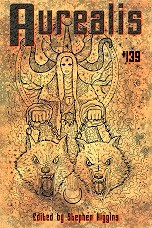“Every Nook and Cranny” by Daniel Baker
“Taxman” by Georgia Angus
“All That Perfect Blue” by Laura Gray
Reviewed by Christos Antonaros
In “Every Nook and Cranny” by Daniel Baker, we share an interesting interpretation of the afterlife described through childish ignorance, fear, melancholy, grief, and a hopeful ending. An afterlife that continues indefinitely painted with the colors of a new dawn. We read through the eyes of two characters, Mr. Vergess and Elli’s. The former owns a shop that sells mythological gods in a jar, while the latter spends every day picking a jar and opening it. Mr. Vergess, however, appears to have undertaken the sacred duty of protecting his customer from mysterious, lethal forces. An excellent depiction of, initially, the cruelty of the stages of grief and, finally, of their cathartic resolution. A story with meaningful sets of dialog and action scenes that are not just filling up the gaps because simply the narrative does not have many.
“Taxman” by Georgia Angus argues the effects of colonization on cultures that are not as technologically advanced as the colonizer. A colonizer who demonstrates a non-interest in exchanging knowledge or help but mainly interested in pillaging natural resources. Misha and her mother hunt to offer their prey to the gods. It is not a primitive belief in deities that guides their sacred obligation, but humans who have descended with a spaceship and are pretending they have godlike powers. Being technologically disadvantaged, however, does not mean that the villagers are stupid. On the contrary, Misha will soon realize what is going on and will challenge the “wrath of the gods.” Reading the story thoroughly, we detect similarities in viewpoints from both sides, colonizers and natives, between Misha’s village and our modern history. A difference that strikes us though, is who won and who eventually lost the cultural battle.
Finally, in “All That Perfect Blue” by Laura Gray, we are offered a colorful portrayal of the relationship between a father with Alzheimer’s disease and his daughter, Frankie. By using a machine that captivates colors from around the universe, Frankie looks on a planet for the perfect blue color for her father to finish his artwork. What might captivate a reader is the apparent desire of a daughter to satisfy her father’s last request, which most probably he has forgotten. In addition to Frankie’s determination, other elements that make this story filled with emotions are the moments of communication between Frankie and her father and the emotional aftermath of those communications. A beautiful story with strong emotions transformed into meaningful dialog, self-reflective monologs, and extraterrestrial landscapes detailed from a somewhat melancholic perspective.
Christos Antonaros is now an English teacher proud for his students reading science fiction and arguing. He is also an author, whenever he has time.
 Aurealis
Aurealis